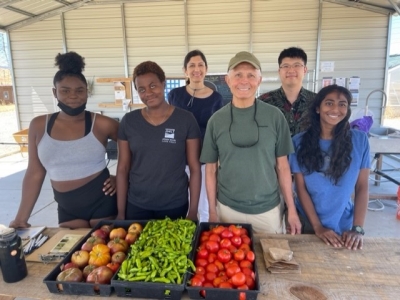


Sadly, many foster youth experience severe trauma, neglect, physical and sexual abuse, parental substance abuse, and mental illness. Studies show that when these youth transition into adulthood, they are at heightened risk for a variety of mental and physical health threats, both because of their prior experience and because many are negatively affected by the social determinants of health. Under- or unemployment is one such social determinant, attributable to a variety of factors, including a lack of transportation, the need for childcare and food, and the absence of soft skills needed for employment. Among foster youth between the ages of 18 and 21, 70 percent are unemployed.
To provide foster youth transitioning to adulthood with foundational job skills that can help them avoid these common threats, the John Muir Land Trust (JMLT), First Place for Youth, Uplift Family Services, Youth Homes, and Contra Costa County Independent Living Skills Program created the Family Harvest Farm Initiative. This 6-12 month training program will ultimately serve 15-25 transitional age youth annually on 3.5 acres of a 17-acre site in Pittsburg that JMLT acquired as part of a ten-year lease agreement with Pacific Gas & Electric. Through the training experience, the youths receive wrap-around social services, gain access to fresh food, learn and practice transferrable employment skills necessary for meeting employer expectations in all types of entry-level jobs, and receive guidance about continuing education opportunities.
After JMLT secured approximately $500,000 in funding to prepare the site, the CHF approved a $62,500 Executive Director discretionary grant for the partners to work with Emerald International HPC to conduct a needs assessment and develop a multiyear business plan for this initiative. Having achieved that initial goal, the CHF then granted the collaborating partners $240,000 to implement the plan from March 1, 2020 – June 30, 2021.
The plan involved a two-tier apprenticeship program:
Despite the challenges of the COVID-19 pandemic, through June 2021, the partners:
An updated plan for implementing Phase II of the initiative had the following achievements:
o Weekly workshops, conducted by community partner organizations, focused on farm & life skills; socio-emotional learning; employment & education pathways, financial literacy etc.
o Quarterly one-on-one coaching sessions focusing on personal & work-related goals
o Access to fresh organic food during the program and to take home
o Support for successful transition to next work opportunity or education
o Gaining confidence in their ability to establish and maintain positive relationships
o Completing a transition plan
o Overall happiness with the FHF experience and would recommend the program to a friend
For 2023, the CHF awarded JMLT $50,000 to implement Phase III of the initiative, aimed at employing 15 apprentices. In addition to the ongoing services and programs noted above, key activities and expected outcomes include:
As this is the final year of CHF support, the Phase III plan indicates that JMLT has garnered corporate, government, private foundation support, and established an individual donor base to support and sustain the Farm. The plan also indicates that revenue from government sources may ultimately become their largest revenue stream.